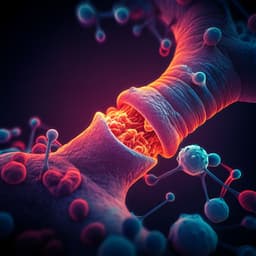
Medicine and Health
COVID-19 mRNA vaccine-mediated antibodies in human breast milk and their association with breast milk microbiota composition
S. Zhao, K. Y. W. Lok, et al.
The study addresses whether SARS-CoV-2 mRNA vaccination in lactating women alters breast milk microbiota and how such changes relate to vaccine-induced anti-SARS-CoV-2 antibody levels in milk. Given the burden of COVID-19 variants and low vaccination uptake among lactating mothers due to safety concerns, understanding antibody transfer via breast milk and the potential impact on the infant gut microbiome is important. Prior work shows vaccine-induced antibodies appear in milk and infant stool, and early-life microbiota influences immune development. Gut microbiota composition has been linked to vaccine immunogenicity and adverse events. However, effects of vaccination on breast milk microbiota and their influence on milk antibody responses were unclear. This longitudinal study in Hong Kong investigated microbiome changes before and after BNT162b2 vaccination and their association with anti-SARS-CoV-2 antibody kinetics in breast milk.
Background literature indicates: vaccine-induced SARS-CoV-2-specific antibodies are detectable in breast milk and infant stool; early-life gut microbiome shapes long-term health and immune development; specific gut microbes (e.g., Bifidobacterium adolescentis, Prevotella copri, Megamonas spp.) have been associated with vaccine responses and adverse events. Studies on SARS-CoV-2 infection effects on breast milk microbiota showed mixed findings, with some reporting no substantial differences in composition or diversity after mild infection. Evidence suggests entero-mammary transfer of microbes may influence milk microbiota. Probiotic Bifidobacteria have been linked to enhanced vaccine responses in infants and children. These prior findings motivate examining vaccination-associated shifts in breast milk microbiota and links to antibody responses.
Design: Prospective longitudinal cohort of lactating mothers in Hong Kong planning to receive BNT162b2 mRNA vaccine (June–December 2021). Inclusion: seronegative for SARS-CoV-2 pre-vaccination; excluded if two-dose series not completed. Participants: 49 recruited; after quality control and exclusion of an outlier, 44 participants with 175 samples across timepoints. Sampling: Breast milk self-collected at four timepoints—pre-vaccination, 1 week post-first dose, 1 week post-second dose, and 1 month post-second dose. Samples transported within 8 hours, aliquoted, stored at −80 °C. Demographics and lifestyle collected via questionnaires. Ethics: IRB UW-21-415; written informed consent; STROBE guidelines followed. Antibody assays: Measured SARS-CoV-2 spike receptor-binding domain (RBD)-specific IgA and IgG in defatted breast milk aqueous fraction by ELISA. Plates coated with recombinant RBD (100 ng/well) or PBS control for background subtraction; blocked with Chonblock buffer; samples diluted 1:100; HRP-conjugated anti-human IgG or IgA secondary (1:5000); TMB substrate; stop with 2 M H2SO4; read at 450 nm. Cutoff defined as mean OD of negatives + 3 SD. IgA treated as main outcome. DNA extraction and sequencing: Pre-processed milk; pellets extracted with QIAamp PowerFecal Pro DNA Kit with bead-beating. V3–V4 16S rRNA amplicons sequenced on Illumina MiSeq. QIIME2 pipeline used: quality control, demultiplexing, DADA2 denoising, rarefaction to 60,407 reads/sample; taxonomy assigned with SILVA 138-99 classifier. Post-filtering: 2116 ASVs in vaccine cohort. Data deposited: SRA PRJNA917338. Independent unvaccinated validation cohort: 110 Chinese lactating mothers sampled at 4, 8, 12 weeks postpartum; same pipeline applied. Functional prediction: PICRUSt2 to infer KEGG pathways from 16S data. Statistical analyses: Continuous variables summarized as median (IQR), categorical as percentages. Group comparisons by Fisher’s exact test (categorical) and Mann-Whitney/Wilcoxon tests (continuous, paired where applicable) with FDR correction. Alpha diversity (Observed ASVs, Chao1, Shannon) assessed via linear mixed models with maternal age and inter-dose interval as covariates; subject ID as random effect. Beta diversity (Bray-Curtis) visualized by PCoA; pairwise multilevel comparisons by pairwise Adonis (PERMANOVA) with FDR adjustment. Differential taxa across timepoints by LEfSe (LDA score thresholds stated; main text >1.5 and p<0.05; elsewhere >2). Associations of taxa with demographics via MaAsLin2. Targeted analysis of Lactobacillus and Bifidobacterium abundances across timepoints by Dunn’s test with FDR. Responder analysis: cohort dichotomized into high vs low IgA at 1 week post-second dose per predefined cutoff; differential taxa by LEfSe; mixed-effects models to test persistence of marker taxa. Predictive modeling: Random forest classification using baseline microbial features (selected differentially abundant species) to predict high vs low IgA at 1 week post-second dose; compared to combined model including demographic variables (age, vaccination interval, intramuscular analgesia use); leave-one-out validation; AUROC and 95% CI computed with pROC; model comparison via bootstrap. Correlation of marker taxa with predicted functional pathways by Spearman correlation. Analyses performed in R v4.2.0; two-sided p<0.05 considered significant.
- Antibody kinetics: After the first dose, breast milk anti-SARS-CoV-2 spike RBD-specific IgA and IgG levels were unchanged vs baseline. One week post-second dose, both increased significantly (IgA OD median (IQR): 0.198 (0.164–0.280) vs baseline 0.116 (0.096–0.137); IgG OD increased from 0.058 (0.054–0.062) to 0.216 (0.132–0.310); p<0.001 both, paired Wilcoxon). By one month post-second dose, IgA returned to baseline (p<0.001), while IgG remained elevated vs baseline (0.164 vs 0.058; p<0.001). IgA and IgG levels correlated moderately (Spearman rho 0.46, p<0.001).
- Clinical covariates: Epidural anesthesia use during delivery associated with lower IgA at one week post-second dose (Mann-Whitney p=0.020). Intramuscular analgesia during labor associated with baseline milk microbiome composition (PERMANOVA p=0.012) but not with post-second dose IgA (p=0.807). Lactation stage did not significantly influence baseline beta-diversity (p=0.349).
- Microbiota diversity and composition: Chao1 richness increased from baseline to 1 week post-first dose (p=0.044, LMM), then returned to baseline at 1 week post-second dose; Shannon diversity unchanged (p=0.440). Beta diversity shifted significantly between pre-vaccination and all post-second dose timepoints (adjusted p=0.030, 0.006, 0.006; pairwise Adonis). In an independent unvaccinated cohort, Chao1 diversity declined over time and no significant beta diversity changes were observed.
- Differential taxa over time: 109 species differed between pre- and post-vaccination timepoints; 10 species consistently differed across all three post-vaccination timepoints. Fifty-three species differed between baseline and post-second dose, including Anaerococcus octavius, Arthrobacter russicus, Bacteroides caecimuris, Clostridiaceae bacterium, Helicobacter rodentium, Lactobacillus aviarius, and Rothia sp. (LEfSe).
- Baseline microbiota and antibody response: At baseline, Shannon diversity was higher in high-IgA vs low-IgA participants (p=0.046), while Chao1 richness and beta diversity did not differ (p=0.464 and p=0.071). Firmicutes were relatively higher and Proteobacteria lower in low-IgA group. Twenty-three species were differentially abundant between high- and low-IgA groups at baseline (LEfSe p=0.004). Unclassified Neisseria and Corynebacterium kroppenstedti had the largest effect sizes (LDA 3.69 and 4.12). Unclassified Neisseria and Neisseria elongata remained persistently higher in high-IgA subjects (mixed-effects p=0.045 and 0.031).
- Post-vaccination taxa in responders: At 1 week post-second dose, Bifidobacterium bifidum and unclassified Bifidobacterium were more abundant in high-IgA subjects (LDA 2.59 and 2.87).
- Predictive modeling: A random forest model using five baseline microbial features (Neisseria elongata, Pseudomonas balearica, unclassified Pseudopropionibacterium, unclassified Neisseria, unclassified Aggregatibacter) predicted high vs low IgA at 1 week post-second dose with AUROC 0.72 (95% CI 0.58–0.85), outperforming a combined microbial+demographic model (AUROC 0.68, 95% CI 0.55–0.81; bootstrap comparison p=0.693).
- Functional pathways: Nine predicted microbial pathways were enriched at baseline in high-IgA subjects (adjusted p<0.05), notably sugar metabolism pathways such as sucrose degradation IV, glucose/glucose-1-phosphate degradation, and fucose degradation; many correlated positively with selected bacterial markers. Superpathways for arginine and polyamine biosynthesis also correlated with markers (except Neisseria elongata).
- Probiotic genera: Vaccination did not significantly change overall abundances of Lactobacillus and Bifidobacterium in milk, except for increases in L. aviarius and L. fermentum at some timepoints; these were not persistently higher in high-IgA subjects. Beneficial Bifidobacteria abundances were largely unaffected by vaccination.
Findings indicate that BNT162b2 vaccination in lactating mothers elicits robust, but transient, IgA and sustained IgG responses in breast milk, potentially enhancing infant mucosal protection. Vaccination was associated with dynamic shifts in breast milk bacterial richness and composition distinct from patterns in an unvaccinated cohort, suggesting a vaccine-related effect. Importantly, key beneficial taxa such as Bifidobacteria were not reduced, alleviating concerns about detrimental impacts on probiotic transmission to infants. Baseline milk microbiota composition related to subsequent antibody levels: higher Shannon diversity and enrichment of unclassified Neisseria and Neisseria elongata characterized mothers with higher IgA responses. These Neisseria spp. may modulate immunity via TLR2 signaling or outer membrane vesicle-mediated adjuvanticity, potentially augmenting vaccine-induced responses; however, causality and safety require further study. Functional predictions support a role for microbiota-driven sugar metabolism (e.g., fucose, sucrose, glucose pathways) and amino acid/polyamine biosynthesis in shaping immune responses, possibly through effects on microbial colonization, SCFA production, and immune modulation in the infant gut. Post-vaccination enrichment of Bifidobacterium (B. bifidum and unclassified Bifidobacterium) in high-IgA subjects aligns with literature linking Bifidobacteria to enhanced vaccine immunogenicity. Overall, the data suggest two complementary mechanisms by which vaccination may confer infant benefit through breast milk: direct antibody transfer and favorable microbiota composition/functions associated with stronger humoral responses. The absence of declines in beneficial probiotics post-vaccination supports the safety of mRNA vaccination during lactation with respect to milk microbiota.
This longitudinal study demonstrates that BNT162b2 vaccination in lactating mothers increases anti-SARS-CoV-2 IgA and IgG levels in breast milk (with IgA peaking at one week post-second dose and waning by one month) and is associated with dynamic but not detrimental changes in breast milk microbiota. Beneficial Bifidobacteria were preserved, and specific baseline microbial signatures, particularly Neisseria spp., predicted higher IgA responses (AUROC 0.72). Predicted functional pathways implicated sugar metabolism and amino acid/polyamine biosynthesis in immunomodulation. These findings support vaccination during lactation as potentially providing dual protection to infants via antibodies and beneficial microbiota. Future research should validate these associations in larger, diverse cohorts with contemporaneous controls; assess neutralizing activity alongside binding antibodies; establish causality and safety for candidate immunomodulatory taxa (e.g., Neisseria spp.); measure human milk oligosaccharides and other metabolites; include infant clinical and microbiome outcomes to elucidate transmission and immune effects; and compare different vaccine platforms.
- Modest sample size and lack of an internal longitudinal unvaccinated control cohort; an external pre-pandemic validation cohort with differing lactation stages was used, which may introduce confounding despite analyses suggesting minimal lactation-stage effects.
- Neutralizing antibody levels in breast milk were not directly measured; inference relies on prior correlations with binding antibodies.
- Causality and safety of candidate taxa (e.g., Neisseria spp.) as potential immunomodulators are unproven.
- No infant clinical, immunological, or metagenomic data were collected; thus, transmission and effects on infant immunity could not be assessed.
- Human milk oligosaccharide levels were not measured, limiting interpretation of microbiota–metabolite–immunity interactions.
- Effects of non-mRNA vaccines (e.g., inactivated platforms) were not investigated.
Related Publications
Explore these studies to deepen your understanding of the subject.







